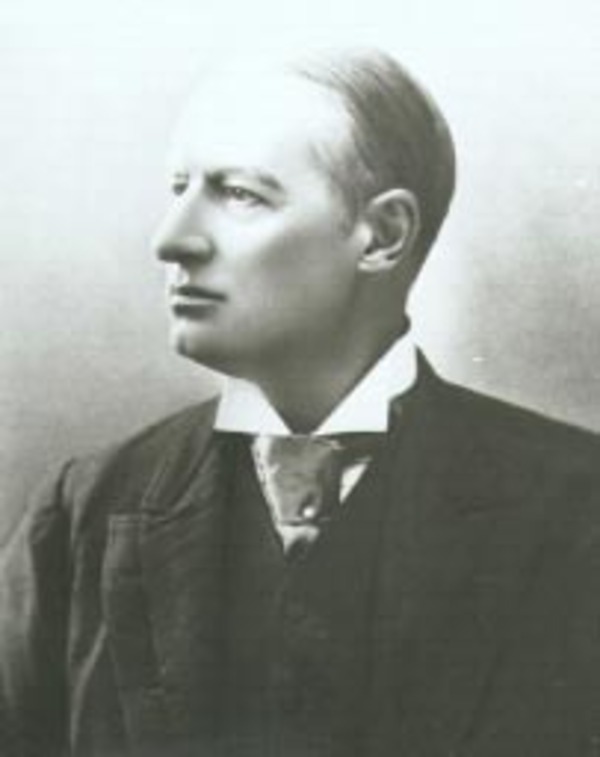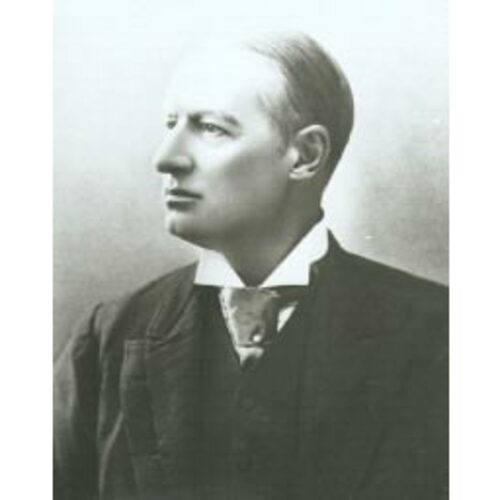
Source: Courtesy of Wikimedia Commons
ROBINSON, Sir WILLIAM CLEAVER FRANCIS, lieutenant governor; b. 14 Jan. 1834 in Rosmead, County Westmeath (Republic of Ireland), son of Hercules Robinson, naval officer, and Frances Elizabeth Wood; d. 2 May 1897 in London, England.
William Cleaver Francis Robinson was a faithful servant of the mid-Victorian empire. As one of a small band of professional staff of the Colonial Office who moved from palm to pine and from tropical plantation to settlement colony, Robinson was in the company of such men as Arthur Hamilton Gordon*, William Francis Drummond Jervois, and Anthony Musgrave*. All three were to have a significant impact on British North America.
Robinson was educated at home in Rosmead and at a naval school in New Cross (London). A quiet, reserved young man with a passion for music, he lived somewhat in the shadow of his elder brother, Hercules George Robert, a Sandhurst graduate. “Tall and slight, with an intellectual cast,” William was a contrast to his congenial, athletic brother, who would also serve the empire, but as the governor of colonies less remote than those to which William was appointed.
The 21-year-old William Robinson began his apprenticeship in the colonial service in 1855 as secretary to his brother, then the lieutenant governor of St Kitts. In 1859 Hercules was appointed governor of Hong Kong, and William followed him there, again acting as private secretary. Robinson’s first major appointment came in 1862, when he returned to the West Indies as administrator of Montserrat, a post he held for three years. He would acquire more than vice-regal status that year, for on 7 April in Ireland he married Olivia Edith Dean Townshend, the daughter of the bishop of Meath. Olivia was to bear three sons and two daughters as the couple progressed from one outpost of empire to another. In 1866 Robinson became governor of the Falkland Islands, an inhospitable colony which he described as “the fag end of the world.” After the Falklands, most assignments would have been a welcome relief for the young couple, and word that Robinson would be lieutenant governor of Prince Edward Island was good news indeed.
Prince Edward Island, as Robinson took office in October 1870, was entering a critical period. Since 1865 it had been the fixed position of the Colonial Office that the colony be either tempted or coerced into union with the other British North American colonies at the earliest possible date. There can be no doubt at all that Robinson’s principal task was to see union achieved. In his correspondence with Lord Kimberley, the colonial secretary, union is a central theme.
Robinson proved himself an astute observer of and a shrewd player in Island politics. Within months of his arrival, he was convinced that only financial necessity would prod the Island to accept union. The most likely source of a financial crisis severe enough to offset the independence of the Islanders, he surmised, would be the construction of a railway. By March 1871 he was able to tell Kimberley that payment of a railway debt by the dominion government would be an effective inducement for Islanders, but that the offer would have to be carefully timed for maximum effect. Robinson’s analysis was almost perfect. As if playing into the lieutenant governor’s hands, the government of James Colledge Pope* passed a railway act the following month, and construction of the line began in October. In September 1872 Robinson wrote that “with the Railway debt upon their shoulders . . . the majority of the people will before long give their voices in favor of Confederation.” Three months later he reported in confidence that he should be able to “hand the Island over to the Dominion within six or eight months at the latest,” and indeed in February 1873 Premier Robert Poore Haythorne was obliged to open negotiations with the Canadians. Although the Haythorne government was defeated in the subsequent election, union had become inevitable. The succeeding administration of J. C. Pope won some minor concessions from the dominion negotiators and on 1 July 1873 Prince Edward Island entered the Canadian confederation.
By adroit intervention and constant pressure Robinson had played an important role in convincing Island politicians that union was the economic salvation of the colony. He was not slow to point out his contribution, especially in his correspondence with the Colonial Office. On the eve of the Island’s reluctant marriage to the dominion, he was awarded a cmg for his furtherance of imperial colonial policy. His principal mission accomplished, he left the Island late in 1873, and the following year he accepted an interim assignment as governor of the Leeward Islands. He was succeeded in Charlottetown by Sir Robert Hodgson*.
Having proved himself a capable servant of imperial policy in Prince Edward Island, Robinson was considered, in 1874, well qualified for another difficult post, the governorship of Western Australia. His task there was to resist demands for responsible government. He successfully did so, and in 1877 received both a new posting as governor of the Straits Settlements, where he replaced Jervois, and a kcmg. In 1880 he returned to Western Australia for a second term. His talents as a musician and composer were welcome in Perth and added a dimension to the cultural and social life of the town.
Success in Western Australia led, in 1883, to Robinson’s appointment as governor of South Australia, where his role was largely ceremonial. His inauguration in Adelaide was marked by the performance of one of his own compositions, “Unfurl the flag,” and a number of his songs became popular throughout Australia. He was in demand as a public speaker and was remembered as a governor who entertained more people in Government House than any of his predecessors. In May 1887 he was promoted gcmg.
Made acting governor of Victoria in 1889, Robinson sought a permanent appointment there, but the following year he found himself again appointed to Western Australia, his task to oversee the introduction of parliamentary government in the colony. The influence he had been able to exert in his previous terms was, under self government, seen as inappropriate, and he soon found himself at odds with the new administration of Premier John Forrest. Unhappy with this turn of events, Robinson chose to retire, returning to London in 1895 at the age of 61.
Despite his seniority, Robinson was offered no further employment by the Colonial Office. On 2 May 1897, after a short illness, he died. As an obituary in the London Times put it, “A great deal has been said and can be said in favour of the new type of colonial governor, the peer of high position or political eminence. . . . If, however, there was wanted a vindication of the old class of viceroy, one would not have to go beyond Sir William Robinson to find it.” Robinson left a total estate of £84,058 and was survived by his wife and five children.
In addition to official reports, Sir William Cleaver Francis Robinson is the author of On duty in many lands: a lecture delivered at the Young Men’s Christian Association Hall, on the evenings of the 25th and 29th September, 1884 (Adelaide, Australia, 1884) and The physical geography of the south-west of Western Australia: a paper read before the South Australian branch of the Geographical Society of Australia on the 27th September, 1886 (Adelaide, 1886).
PRO, CO 226/107–11. Examiner (Charlottetown), 1870–73. Patriot (Charlottetown), 1870–73. Times (London), 3 May 1897. ADB. Australian encyclopædia (10v., Sydney, 1965), 7: 473. Colonial governors from the fifteenth century to the present, comp. D. P. Henige (Madison, Wis., 1970). DNB. Bolger, P.E.I. and confederation. Canada’s smallest prov. (Bolger). J. W. Cell, British colonial administration in the mid-nineteenth century: the policy-making process (New Haven, Conn., and London, 1970).
Cite This Article
Andrew Robb, “ROBINSON, Sir WILLIAM CLEAVER FRANCIS,” in Dictionary of Canadian Biography, vol. 12, University of Toronto/Université Laval, 2003–, accessed April 30, 2025, https://www.biographi.ca/en/bio/robinson_william_cleaver_francis_12E.html.
The citation above shows the format for footnotes and endnotes according to the Chicago manual of style (16th edition). Information to be used in other citation formats:
| Permalink: | https://www.biographi.ca/en/bio/robinson_william_cleaver_francis_12E.html |
| Author of Article: | Andrew Robb |
| Title of Article: | ROBINSON, Sir WILLIAM CLEAVER FRANCIS |
| Publication Name: | Dictionary of Canadian Biography, vol. 12 |
| Publisher: | University of Toronto/Université Laval |
| Year of revision: | 1990 |
| Access Date: | April 30, 2025 |



